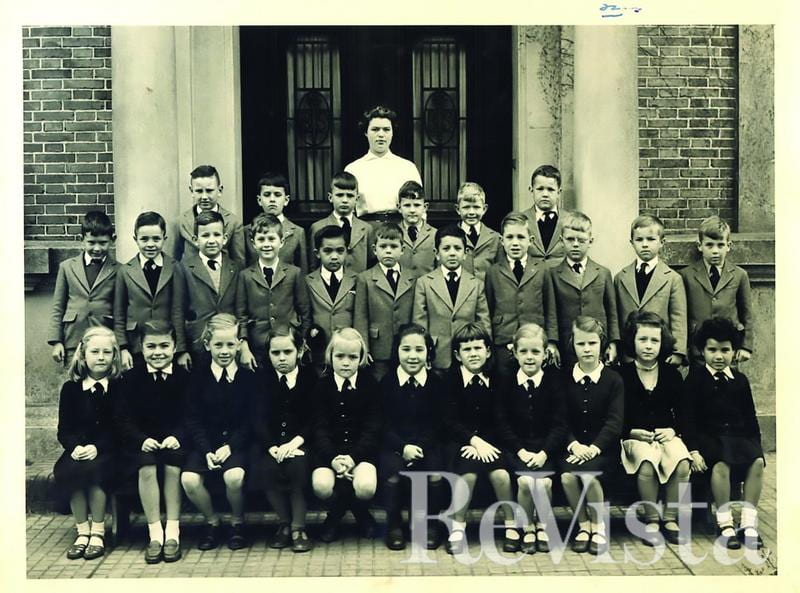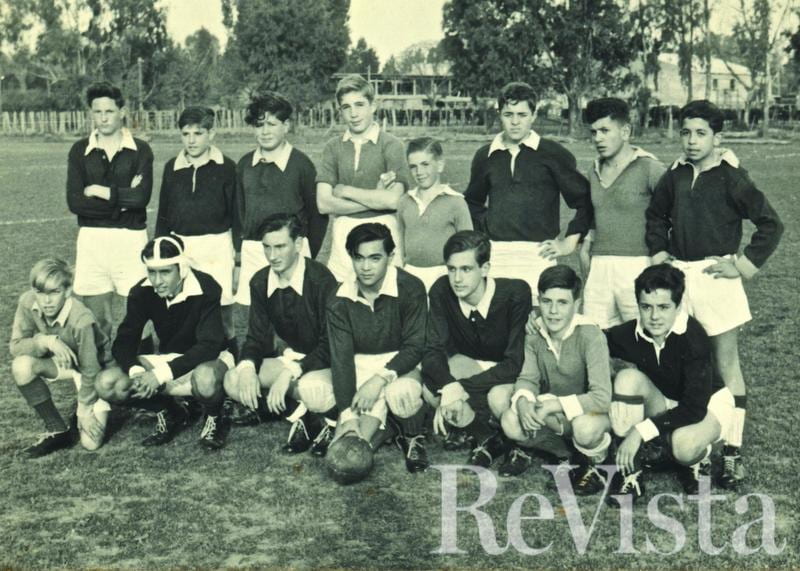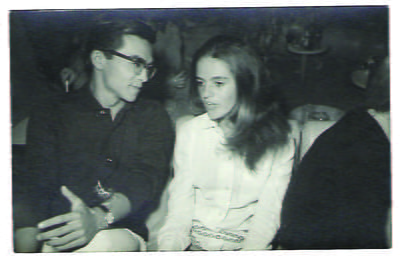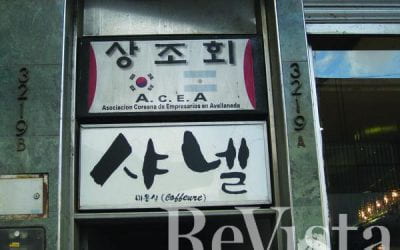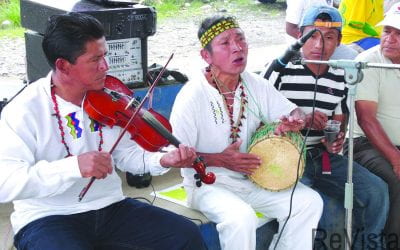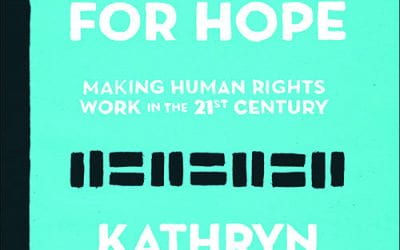Growing Up Chinese in Uruguay
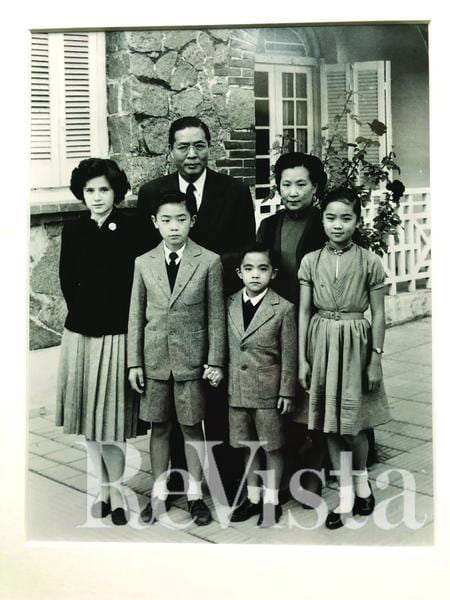
Anna, Alejandro, Michael and Lina (from left to right) with their parents in front of their home in Pocitos, Montevideo.
When the Dutch liner S.S. Boissevan docked in the port of Montevideo in March 1953, it brought my family all the way from Hong Kong to settle in Uruguay. There were eight of us, my father and mother, her sister and my maternal grandmother, and my siblings Anna (11), Alejandro (9), Lina (almost 8) and I, three months short of my fifth birthday. Four other Chinese families had also made the journey with us and as we disembarked, we may well have established the single-day record for Chinese immigration to Uruguay, as I don’t think the Chinese community, then or later, ever exceeded 300, counting men, women and children.
Amidst three million Uruguayans, that made us a minority of 0.01%. All of us there that day were in one way or another a consequence of the victory of the Communists in China four years earlier. The heads of our families had been in business or professionals or held public office (or all three, as in the case of my father) and were part of an educated, sophisticated urban class that, in addition to their local dialect, were fluent in Mandarin. We were the second wave of Chinese, preceded decades earlier by economic migrants in search of a better life. Like in the United States, they came from Guangdong province, spoke Cantonese and established Chinese restaurants and laundries.
In China, my father was a textile engineer and entrepreneur who went to Yunnan province, where my siblings and I were born, to establish a brand new world-class textile mill. During the war with Japan, it was the only modern textile mill outside of enemy hands. When the war concluded, my father was elected to represent the province in the National Assembly. Nominally, he belonged to the Kuomintang, the party of Generalissimo Chiang Kai-shek, but in the National Assembly, my father was very involved in the efforts to curtail his dictatorial powers. With the civil war against the Communists raging, my father also helped found a social-democratic alternative led by university professors and intellectuals that was ruthlessly eliminated by Chiang’s secret police. My father ended up being arrested and tortured. With my mother working tirelessly behind the scenes and with the help of my father’s closest friends, an escape right out of Hollywood was engineered and my family landed in Hong Kong.
With the Communists victorious and the retreat of Chiang to Taiwan, the National Assembly was “temporarily” relocated to the island. As if his detention had never happened, my father was invited to move to Taiwan to once again occupy his seat as the last elected representative of Yunnan province “until elections could be held once again.” My father had no intention of being part of this charade. At the same time, the new Communist government, hungry for professionals with technical expertise, was also inviting my father to return. But he felt China was on a path that ultimately would not be to his liking. This left my parents in a conundrum: neither my father nor my mother wanted to raise us in a British Crown Colony.
The natural default was the United States, where so many Chinese went after the “fall of China.” The U.S. consulate in Hong Kong granted visas to the immediate family but balked at including my grandmother and aunt. My parents were not about to leave them behind and so the possibility of Latin America arose. For my parents, it must have been as far away as they could imagine from war and China. We ended up with immigration visas from Brazil, Argentina and Uruguay. My father’s bank arranged for the local manager of Pan American Airways (then the premier world airline) to come home to show us promotional films of all three countries. Brazil was still under Getúlio Vargas, who had been a dictator and was in the midst of an embattled presidency. Argentina was ruled by strong man Perón. And then, in the flickering black and white images on the screen in our living room, my parents saw the Switzerland of the Americas: a wealthy country with a thriving middle class, a clean and orderly modern city by the sea, with well-fed, well-dressed people, schools, hospitals and universities, endless grasslands stocked with sheep and cattle, flush with gold reserves from wool and beef exports during World War II and now the Korean War, and a fresh World Cup, its second, won in a final against host Brazil in Rio’s Maracaná Stadium.
Arriving in late summer, I remember our first days in Montevideo as full of sunshine and open air. Coming from Hong Kong, where food supply was still basic and milk was stretched with water, my siblings and I couldn’t believe how good everything tasted. Every morning we would rush to the breakfast table, help ourselves to slices of freshly-baked, sparkling-white bread on which we laid thick slabs of butter as if it were cheese and washed everything down with huge cups of café con leche.
Naturally, school was a priority, but our Spanish was fairly non-existent. My sister Anna and my aunt Theresa (close in age), who had learned some English in Hong Kong, were admitted into The British School and the younger children into the Deutsche Schule. My mother informed the German headmaster with trepidation, “I’m afraid my children speak no Spanish.” “My dear lady,” he replied. “Why should that be a problem? What is a school for if not to teach?” The school had two shifts, one in the morning and another in the afternoon, where the same lessons were taught to a different set of students. With great insight, the headmaster had us attending both shifts.
When you acquire a language in your childhood, it becomes so natural that it’s difficult to remember that you actually had to learn it. I have no memory of becoming fluent in Spanish but I do recall that when we moved into our first home in Montevideo, a boy who lived a block away and was three or four years older would drop by after school and we would walk around the neighborhood. We couldn’t really talk to each other, so I would point to an object and he would say its name in Spanish, and I would repeat it, and we would do this through all our walk. I thought this was great fun and he must have too, as he did this daily until one day we were chatting.
The kindness of my friend came naturally, without a trace of self-consciousness, and his openness and warmth were characteristic of the general reception my family got in Uruguay. Looking back, and especially today when immigrants spark such a mixed response in the United States, I’ve wondered what made possible our easy acceptance by the Uruguayans.
One important reason, I think, was that we arrived at the tail-end of the golden age of Uruguay. In the early years of the 20th century, led by a remarkable and visionary president, José Battle y Ordoñez, Uruguay became the first welfare nation in the world, with many of the characteristics that we associate today with Scandinavia. Battle y Ordoñez expressly defined the role of the state as safeguarding the welfare of the people. By 1915, ahead of the United States, Uruguay had established an eight-hour workday, a minimum wage for agricultural workers, one day of rest a week, workmen’s compensation in the event of job injury and retirement pensions. Education was made compulsory, free and secular. There was a free health system, with the government actively seeking to enroll the less affluent. Divorce was legalized in 1907 and in 1913, women could demand it on their own. The 1917 constitution enshrined the separation of church and state and established proportional representation and secret balloting. Women suffrage became law in 1932, 12 years before France and 39 years ahead of Switzerland.
Behind all this was the wealth generated by a country that was world-class in the production of items in high demand around the globe which at that time included wool and beef, during a period of great freedom of trade. With sheep and cattle ranching requiring few hands and a population that was only slowly inching towards three million, in a country five times the size of the Netherlands and 80% larger than South Korea, in 1930 the GDP per capita of Uruguay ($4,301) was ahead of the average GDP per capita ($4,297) of the twelve leading European economies. Then the Great Depression, with its cycles of retaliatory protectionism, led to a precipitous shrinking of global trade. Like other nations, Uruguay was deeply impacted. But two factors allowed Uruguay to recover and to keep its prosperity going into the 1950s. The first was World War II (and later the Korean War), which once again demanded wool and beef. The second was a national policy of import substitution that gave rise to an industrial sector.
When we arrived, Uruguayans had the open and cheerful disposition of people who for decades could take for granted peace and universal access to all the basics of life and civilization. For sure, there were wealthy Uruguayans but, in terms of the daily necessities, the difference between them and their fellow citizens was one of sophistication rather than need. Accordingly, Uruguayan society in the 1950s was characterized by high social capital, where citizens felt equal regardless of income, education was universal, discourse was eminently courteous, passion and animosity were confined to the football stadium and crime was petty and low. In an environment with plenty for all, the natural response was to welcome newcomers. Indeed, Uruguay’s population was shaped by large waves of immigration.
First came the Spaniards in the days of conquest who, unlike in Peru and Mexico, encountered primitive nomadic warrior tribes and ended exterminating or pushing them into neighboring countries. In the late 1700s and early 1800s, African slaves were introduced but, ranching never needing the extensive labor demanded by plantations, their numbers were small. In the latter half of the 19th century, modern Uruguay was defined by large numbers of Spanish and later Italian immigrants, together with a smaller but influential contingent from Great Britain.
This made Uruguayan society white, as white as any European nation in the 1950s. Accordingly, what made the Chinese stand out in Uruguay was not that we were immigrants, but that we were Asian. For much of our childhood, my siblings and I were often the first Orientals Uruguayans had seen. Occasionally, people would stop us just to wonder. Once, on the principal downtown avenue of Montevideo, my brother and I were asked if we were twins, despite our five years difference. I of course replied, “Yes!”
At school, when we first arrived, kids in the playground would come up to us and stretch the corner of their eyes upwards and say “chinito, chinito,” (the diminutive of “chino” or Chinese.) My brother would get angry but I would laugh and push the corners of my eyes towards my nose and say “uruguayito, uruguayito.” Instead of spiteful or bullying, I remember these incidents as quite innocent. Perhaps an ornithologist would have seen little chicks prancing about marking territory.
In fact, being Chinese and a minority of 0.01% proved to be quite a social advantage. It rendered my siblings and I into rare commodities and, in those pre-internet days where the world was not just a click away, our classmates (and their families) were quite intrigued with us. When we made our entrance into our schools, we were, in today’s terms, “cool.” Kids approached us to talk, they asked us for playdates, they invited us to their birthday parties. This gave us the opportunity to interact and the space for relationships to form so that by the time our novelty wore off, we had established real relationships. Growing up, my siblings and I never lacked friends and we still remain in touch with many of them to this day.
When she was about twelve, influenced by her friends, my sister Lina announced she wanted to become a Catholic. While my father never showed any religious leanings, my mother was a fervent Buddhist. Yet, since Buddhism was not a monotheistic religion, my mother was very supportive, telling Lina that all religions led to God. My brand new Catholic sister then worked on me to take cathechesis lessons at the same convent that had taught her, feasible because nuns could teach boys as long as they wore short pants and at 10 years old, I still did, the cross-over taking place around 12.
After a few months, I too decided to be baptized, again with the blessing of my Buddhist mother. This gave me the opportunity to pick my own godparents. By that time, the British School had decided that I too could have the privilege of being their student and I became great friends with one of my classmates. After school we would play together for hours. To this day, he is one of my closest friends. Spending so much time together, I also got to know his parents well. His mother was always ready to do fun things. She once took us to a live concert of The Platters, on tour in Montevideo, and there could not have been many things cooler for a pair of kids in short pants than listening live to “Only You” and “My Prayer.” A few years later, when we were still too young to drive, she took us around in her little Morris Minor pick-up during Carnival, with the back loaded with friends and a pail full of water balloons, to wreak havoc in the streets of Punta del Este, the seaside resort. His father was an elegant man, with silver hair, a glint in his eye and a ready wit. But what I thought was absolutely magical was how they were together. In the evenings, they would always have a cocktail, I never heard them say anything harsh to each other, and on some special occasions, he would play the guitar or the accordion and she would sing tangos. Who could wish for more wonderful godparents? I was baptized with them beside me, followed by a Chinese banquet at home.
My godfather was an estanciero, or rancher, with an estancia that seemed impossibly far from Montevideo. On school vacations, my good friend and I would spend time there. In the mornings, we would be woken up with glasses of milk straight from the cows. Then, we would ride out with my godfather and his foreman as they inspected the livestock and the pastures, with a couple of dogs running by our horses. As we grew older, from time to time we would help in the work. A favorite was driving herd, when cattle had to be taken to a pen to be inoculated, or collected by trucks to take to market. At midday, we would return to the houses and have lunch, followed by a siesta. Then, the afternoon was ours. Sometimes we would ride out again and race each other, or if there were sheep in the corrals, we might pretend we were at a rodeo and attempt to ride them, or we would kick a ball on the lawn outside the main house. At other times we would go out with shotguns to hunt partridges to bring to the cook. Electricity came from a generator by the side of a large shed next to the ranch house, the radio provided the latest commodity prices and relayed messages (“This is Rosa, I’m arriving on the ten o’clock bus,” “Uncle Pedro’s operation went well,” “Martín says the fencing wire is coming on Wednesday”). There was no television reception. After dinner, we would chat and read.
I realize now that for the ranch hands I must have cut an exotic figure, but like cowboys in the West they are by nature reserved and laconic, and never asked me about China or why I was in Uruguay, and treated me no different than any other friend of the owner’s son. I like to think that they noticed and appreciated how I took to life in the ranch from the very first day they taught me to ride by sitting me on the saddle, telling me to pull the reins in the direction I wanted to go, towards me when I wanted to stop and then gave a smack on the rump of my horse to initiate my riding career. Decades later when I lived in Manhattan and rode every week in Central Park, out of curiosity I decided to take English riding lessons. The instructor told me to go around the ring at various speeds so she could observe me. When I stopped, she said, “You do everything wrong, but you’re so comfortable on a horse that you compensate for it all the time.”
Those days in the estancia instilled in me a deep appreciation for the beauty and serenity of the Uruguayan countryside. The grasslands are flat, with a gentle roll, and in those days before the emergence of a vigorous forestry industry, trees were only solitary lines next to streams or water holes. The naturalist W.H. Hudson, writing in 1885, called it The Purple Land. With no mountains anywhere, looking around me, my gaze travelled free all the way to the distant horizon. You can ride all day and, unless you purposefully head to a house in the distance, you may literally not cross paths with anybody. Once outside the ring around Montevideo, traffic is so light that still today people by the side of the highway will wave at passing cars.
There was another great advantage to being a minority of 0.01%. If we had emigrated to the United States, I suspect it would have been hard for a Chinese boy to escape the stereotypes set by both society at large and the Chinese community itself. Not surprisingly, the two converged in many respects. Especially if we had ended up in the East Coast, Chinese seemed destined to make their living either in a restaurant or a laundry or being a doctor or an engineer. But in Uruguay, nothing indicated that I should aim for MIT or CalTech, or that my extracurricular life should be indoors and cerebral. Attending a British school that was modeled after England’s public (i.e. private) schools and which supplemented local teachers with staff from the United Kingdom, in a country which regularly surprises the world with its football (soccer) prowess, our girls played field hockey and the boys played rugby. I loved it from the start and from the age of ten became a stalwart on the school teams. When we became old enough to play against our counterpart British schools in Buenos Aires, I had the privilege of being the captain of our team, to the surprise (as I later found out) of our Argentine hosts. I went on to form part of the school’s First XV. Indeed, the proudest sporting achievement of my life was, upon returning from college in the States, to play for Old Boys, the club of the British Schools alumni, and win Uruguay’s First Division Rugby championship with an undefeated record.
Fortunately, I was also good at schoolwork and that combination must have contributed to being appointed a prefect, and later, Head Boy of the school. Just like English public schools, the discipline of the school was run by students appointed to the role (prefects), led by a Head Boy and a Head Girl. Prefects made sure nobody ran or pushed or otherwise made a nuisance of themselves in the corridors (or anywhere else), enforced the obligatory use of English everywhere other than in classes conducted in Spanish, checked that everybody came in the prescribed uniform (down to the color of socks), and off-campus made sure that those wearing the uniform lived up to the school’s standards (including giving seats up to women and the elderly in public transportation.) To signal their rank, prefects wore different uniforms and, like teachers, had their own leisure room; to enforce their authority, there was a punishment room to where miscreants were sent during breaks and lunchtime.
At around the age of twelve, social life started to involve the opposite sex and that began a cycle of weekend parties for the next several years where we took to the dance floor and, as we became older, the lights grew dimmer and relationships became more serious. Luckily, I was one of the party regulars but I recall it was then that I became most aware of being different. It was difficult enough under normal circumstances to gather the courage to ask popular girls to dance with you or go out on a date; having to worry about race just seemed more daunting than an imperfect nose or bad hair. Yet most of it was in my head since I don’t recall one instance where any girl said anything remotely racist. In retrospect, I don’t think I fared worse than the average boy in school, and perhaps better, since I remember my girl friends as being really nice, fun and interesting, and those on pedestals too high to reach (i.e., older) always remained friends and one, in due course, even married me.
While school life and partying were far removed from my origins, China was very present at home. My parents spoke Chinese, virtually every meal was Chinese and we all learned to appreciate Chinese ingredients and delicacies that became available only when some ship like the one that brought us would make a stop in Montevideo. Our living room had the dark wooden Chinese furniture, the delicate porcelain vases and the carved ivories that had come with us on the Boissevan. When we got sick as children, the one bright spot was our father coming to sit on our bed to read us the adventures of the Monkey King, with his buddies Piggy and Sandy, escorting the Buddhist monk Tang Sanzang and the holy scriptures on the Journey to the West, a 16th century masterpiece; or the tales of the 108 outlaw rascals of the brotherhood of the marshes who would end up pardoned and saving the empire in another great Chinese classic, The Water Margin.
In timeless immigrant fashion, our mother reminded us that we had to work harder and persevere more; with parents unable to speak the language, we had to make it on our own. She also told us that in life you could lose everything (we were a case in point!) except one thing: your education. It must have sunk in. My brother Alejandro was the only teenager insane enough in the whole of Uruguay to attend the Deutsche Schule in the morning and then rush to a vocational school in the afternoon to learn to operate lathes, draft technical drawings and fix engines, followed by getting up before dawn to do his school homework. He did this every single weekday, and eventually ended up at MIT. My sister Lina in her spare time from the Deutsche Schule became a master seamstress, with the largest diploma I have ever seen. My eldest sister Anna left for college in the States at age fifteen, as did I.
Yet our mother was no tiger mom, whip in hand and doling affection based on performance (she was saving that for her children-in-law.) As we were growing up, she wielded an even more effective weapon: unconditional love and limitless faith in us. Being her children, of course we could do anything we set our minds to, but if along the way we failed, she was absolutely certain we had done our very best. In this way, she ended instilling in us the self-confidence that allowed us to aim as high as our imagination could take us together with the natural presumption that we would give it our all. In fact, none of us remember our parents ever asking us if we had done our homework, let alone forcing us to study. Indeed, I realize now how unconventional our parents were, by both Asian and Western standards. We never got pocket money; instead, we were shown the drawer where money was kept and told we should just take whatever we needed. As a result, we thought about every expenditure. At twelve, I got the key to the house, with the implicit trust that I would know when to come and go, and who to let in. Did they read it in some ancient Chinese parenting manual or did they just bump into the realization that nobody has a stricter taskmaster than oneself?
My parents’ closest friends in Uruguay were drawn from both waves of the Chinese diaspora. On one hand were the Baos and the Lins, people like us that had been successful in business and displaced by the Communist victory. On weekends, the grown-ups got together for mahjong marathons and big Chinese dinners. That provided ample time for the children to entertain ourselves with only the minimum of adult supervision, ensuring that we had a great time. While our parents spoke in Chinese, we spoke to each other in Spanish and our interests, our banter and our humor were identical to those of our Uruguayan friends. But when we were together, we had something in common so obvious that it didn’t have to be acknowledged and we certainly never dwelt on it, but that was invaluable because it was so rare: we were with the only peers who knew exactly what it was like to be growing up Chinese in Uruguay. Being a 0.01% minority meant that it wasn’t only Uruguayans that had a hard time bumping into Chinese people. For many years after I went to the States, whenever I met somebody Chinese, even in the most casual of settings, I assumed we would feel a special connection and was quite confused when that didn’t occur.
Usually, the social interactions between the later wave of Chinese and the earlier Cantonese economic migrants were superficial, taking place at gatherings sponsored by the Chinese Association on important Chinese national holidays and festivals. In addition to class, there was also the language barrier, many of the more recent Chinese coming from Shanghai and speaking no Cantonese, and the Cantonese speaking no Shanghainese or much Mandarin, the official lingua franca of the state, commerce and the educated. But, having lived a few years in Hong Kong, my parents did speak Cantonese and they felt a special appreciation for the openness and straight-forward kindness of the earlier immigrants. My parents were still young, in their thirties and forties, and they became very friendly with a set of second generation Cantonese just ten years or so younger than they. These young men would come home on their days off and play card games that would often include us and that were full of banter and laughter. Sometimes, as a treat, they would take my siblings and I to the movie theaters downtown to see the latest films.
Our Cantonese friends had a huge restaurant on the main avenue of Montevideo that served the best Chinese food in Uruguay for lunch or dinner, but you could also order great Uruguayan cuisine, from steak to veal Milanese, tongue in vinaigrette, Spanish omelette or pasta. In between lunch and dinner, the restaurant served afternoon tea, a custom introduced by the English and readily adopted by the Uruguayans, complete with multi-level trays filled with finger sandwiches and cakes and pastries. On many afternoons during school break and weekends, my siblings and I would go to the restaurant and were allowed to “help” and to explore every nook and cranny of the cavernous place. I think we were good for business because patrons found us very cute behind cash registers or at the bar mixing drinks. During Carnival, the parade of swaying dancers, drummers and floats would snake down the main avenue at night and we were allowed to go to the roof balcony of the restaurant for a front-row view. As the music and the beat of the drums floated up, we rained down confetti (and sometimes naughtier things) on the sidewalks filled with costumed children and their parents.
And so transpired my childhood and adolescence until the time came to go off to university. My choice was Dartmouth College, and a few months later, with my family and my friends waving and wishing me well, I boarded the airplane at Carrasco Airport and soon the green countryside and my childhood receded in the distance. No longer a Chinese boy growing up in Uruguay, I was now a Chinese Uruguayan heading towards my future.
Fall 2018, Volume XVIII, Number 1
Michael Chu is a Senior Lecturer of Business Administration at Harvard Business School and a co-founder and partner of venture capital firm IGNIA in Mexico. He is also a member of the David Rockefeller Center for Latin American Studies Executive Committee.
Related Articles
From Vendedor to Fashion Designer
English + Español
Korean immigrants in Latin America are shaping and developing fashion economies there. Upon arrival, Korean immigrants to Argentina and Brazil may have been lonely, isolated and confused…
Shared Sentiments Inspire New Cultural Centers
English + Español
In the early afternoon of January 3, 2018, in the mountainous village of Shicang, Zhejiang Province, China, firecrackers burst into the air and flags waved in the wind as a parade of Clan…
Evidence for Hope: Making Human Rights Work in the 21st Century
A Review of Evidence for Hope: Making Human Rights Work in the 21st Century Contemporary Human Rights and Latin America On September 5, 1921, Roscoe “Fatty” Arbuckle, Hollywood’s then best-paid star, attended a party in San Francisco’s St. Francis Hotel, drank...



